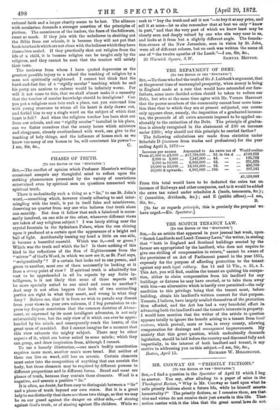THE SCOTCH TENANCY LAW.
(To TH2 EDITOR OF TH2 " SPROTATOR.1 Srn,—In an article that appeared in your journal last week, upon_ " Scotch Landlords and Land-Tenancy Laws," the writer, in stating. that " both in England and Scotland buildings erected by the farmer are appropriated by the landlord, who does not require to- give one shilling of compensation in return," cannot be aware of the provisions of an Act of Parliament passed in the year 1851, expressly for the purpose of affording protection to the tenant. against any such legal robbery. See 14 and 15 Vie., c. 25, s. 3. This Act, you will find, enables the tenant on quitting his occupa- tion, either to claim compensation from his landlord for any- buildings or fixtures he may have erected, or to take them away- with him—an alternative which is hardly ever permitted—the only condition to this privilege being that the tenant must, before: building, obtain his landlord's written consent for that purpose.- Tenants, I believe, have largely availed themselves of the protection, thus afforded, and the Act has had a very beneficial effect in• advancing both the landlord's and the tenant's interests in property. I would here mention that the writer of the article in question appears totally to ignore the benefit arising to a tenant from local= customs, which prevail, more or less, in every county, allowing, compensation for drainage and management improvements. My anxiety that this great question, which undoubtedly demands legislation, should be laid before the country and discussed fully and impartially, in the interest of both landlord and tenant, is myy motive in addressing you on this subject.—I am, Sir, &c.,


































 Previous page
Previous page